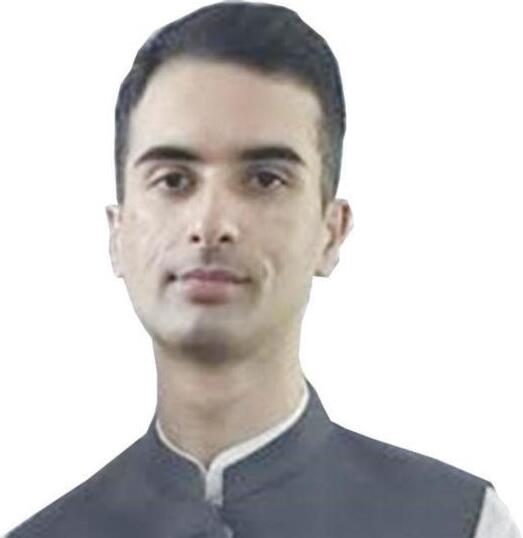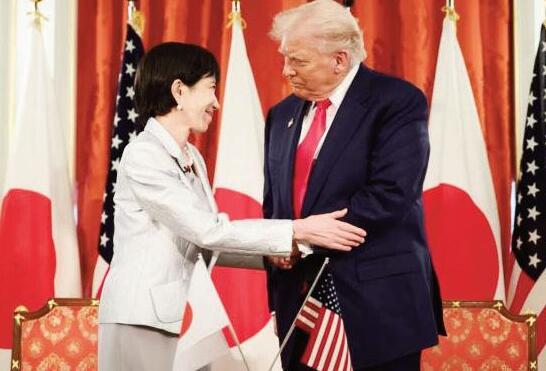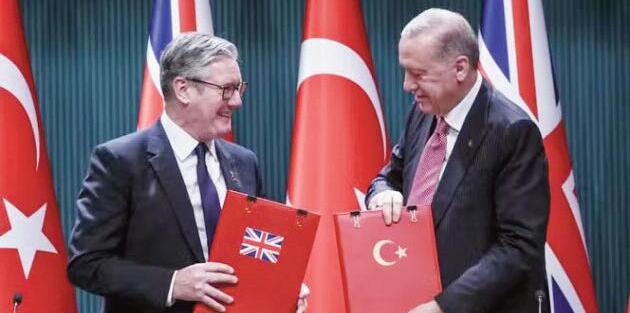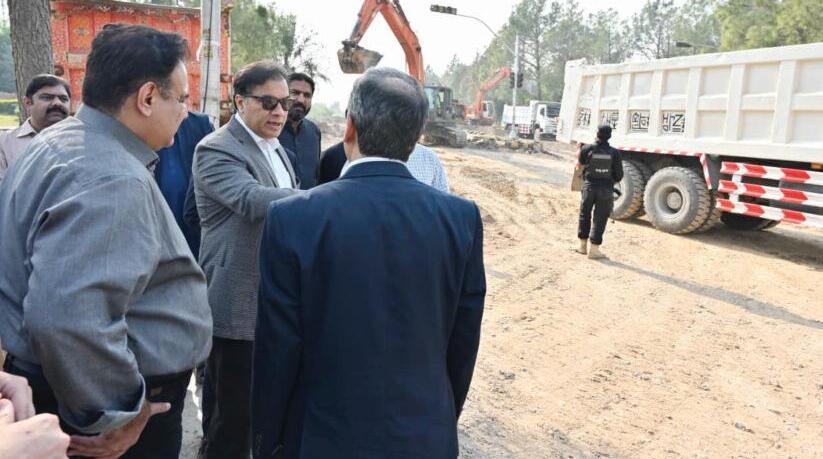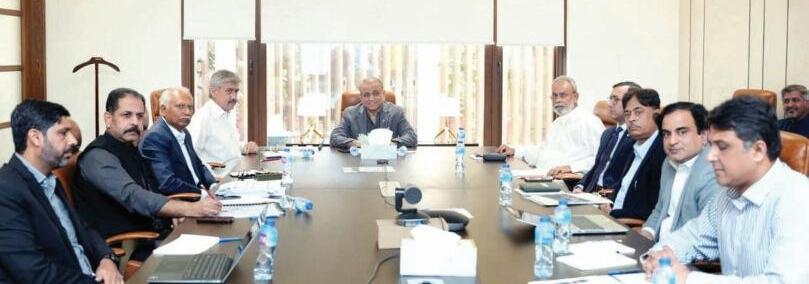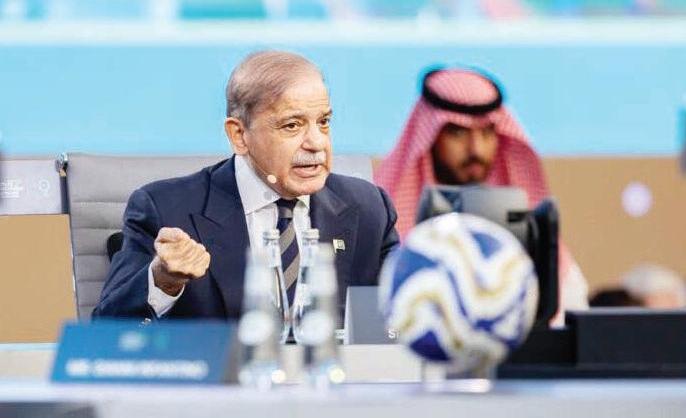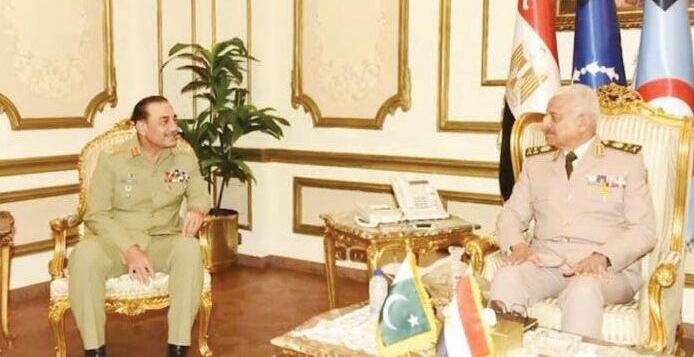S A F G H A N S I D E ‘ B A C K P E D A LS R E P E AT E D LY ’ , S AY S K H A S I F
g DEFENCE MINISTER BLAMES KABUL’S INTERFERENCE, DELHI ’S INFLUENCE FOR STALLED PEACE PROCESS
g REITERATES ‘ KABUL DIRECTLY RESPONSIBLE FOR TERRORISM,’ WARNING ANY ACT OF AGGRESSION FROM ACROSS BORDER WOULD BE MET WITH A ‘ RESPONSE 50 TIMES STRONGER ’
Pakistan slams ‘fabricated’ report on CIA–Mossad talks, Gaza troop deployment
ISLAMABAD s ta f f r e p o r t
The Ministry of Information on Tuesday categorically rejected as completely fabricated and baseless” an Indian media report claiming that Pakistan’s leadership had held secret meetings with the United States Central Intelligence Agency (CIA) and Israel s Mossad to discuss sending Pakistani troops to Gaza under a socalled peace force arrangement The ministry stressed that Pakistan has neither held any such meetings nor agreed to any plan to deploy troops to Gaza reaffirming Islamabad s long-standing and principled stance of non-recognition of Israel and unwavering support for the Palestinian cause “The news item is completely fabricated No such meetings understandings or deals ever took
place between Pakistan s leadership, the CIA, or Mossad,” the ministry said in a statement posted on X (formerly Twitter) “Pakistan does not recognize Israel has no diplomatic or military engagement with it and maintains a clear principled stance in support of Palestinian self-determination ” The statement came hours after India’s First Post citing CNNNews18 alleged that Pakistan was preparing to deploy up to 20 000 troops to Gaza following purported secret meetings between Chief of Army Staff Gen Asim Munir and senior officials from the CIA and Mossad The report further claimed that Pakistani troops would neutralize remaining Hamas elements and act as a buffer force between Israel and Gaza s armed factions under Western instructions in exchange for economic incentives and debt relief from the United States and its allies
by
partnership that includes investments in infrastructure and participation in China-Pakistan Economic Corridor (CPEC) projects According to reports, the agreement was formalised during a meeting between Prime Minister Shehbaz Sharif and Saudi Crown Prince Mohammed bin Salman in Riyadh where both sides discussed a range of mutual interests and regional cooperation The session was attended by senior officials from both countries, including Deputy Prime Minister and Foreign Minister Ishaq Dar Chief of Army Staff Field Marshal Syed Asim Munir and cabinet members from both nations As part of the agreement Saudi Arabia will invest in critical infrastructure projects in Pakistan, notably in dam construction and power transmission lines Furthermore both countries have agreed to establish a joint business council aimed at fostering collaboration between their private sectors In a post-meeting statement on X,
Prime Minister Shehbaz Sharif expressed his appreciation for the Crown Prince’s unwavering support and commitment to advancing the bilateral partnership He acknowledged the enduring strength of the Pakistan-Saudi Arabia ties, emphasizing that the discussions would contribute to deepening the historic cooperation in trade, investment, and economic growth Prime Minister Shehbaz Sharif ’s visit to Riyadh at the Crown Prince s special invitation was part of his attendance at the 9th Future Investment Initiative (FII) Conference Upon his arrival at King Khalid International Airport, he was warmly received by top Saudi officials including the Deputy Governor of Riyadh Prince Mohammed bin Abdulrahman bin Abdulaziz While in Riyadh the Prime Minister is representing Pakistan at the FII Conference, which serves as a platform for global investors, policymakers, and corporate leaders to discuss emerging trends and investment opportunities He is also scheduled to meet with world leaders and heads of international organizations on the sidelines of the event


TCONTINUED FROM PAGE 01
He reiterated that “Kabul is directly responsible for terrorism in Pakistan accusing it of serving as a tool for Delhi He warned that any act of aggression from across the border would be met with a response 50 times stronger TALKS HIT REPEATED ROADBLOCKS
According to security officials, the latest round of Pakistan-Afghanistan peace talks mediated by Turkiye and Qatar continued for three days in Istanbul marking the most extensive engagement between the two sides since the Doha round earlier this month The first session held in Doha followed deadly clashes between border forces and Pakistani strikes on Gul Bahadur group camps inside Afghanistan The Doha meeting resulted in a 48-hour truce and a commitment to reconvene in Istanbul to develop a long-term framework for de-escalation and counterterrorism cooperation
However despite initial optimism the Istanbul discussions soon ran into familiar hurdles During the 18-hour session on the third day the Afghan Taliban delegation repeatedly agreed to Pakistan s logical and legitimate demand for credible and decisive action against the TTP (Tehreek-iTaliban Pakistan) and terrorism,” a senior security source said “But their stance kept shifting after instructions from Kabul ” Officials described the Kabul leadership’s interference as illogical and illegal adding that it had directly caused the breakdown of progress We and the hosts wanted to resolve complex issues in a thoughtful serious manner But the Afghan side refused to commit in writing to verifiable guarantees,” another participant explained Despite the setbacks, a “last-ditch effort” was still underway to salvage the dialogue “The talks are moving towards a final round a security source said emphasizing Pakistan s preference for a diplomatic resolution Mediators from Turkiye and Qatar echoed this view noting that the very continuation of talks reflected mutual re-
straint Even if the discussions did not yield a breakthrough the fact that both sides stayed engaged for three days is significant, one mediator remarked It shows neither wants the process to collapse ” Sources from the Pakistani delegation described the early rounds as “encouraging,” with “serious engagement” and “mutual understanding” on most points except one: verifiable action against terrorist sanctuaries inside Afghanistan We kept hoping to sign a mutual document or at least issue a joint statement a participant said But the Taliban delegation remained reluctant to formalize anything in writing especially regarding guarantees to dismantle the TTP network Officials familiar with the matter said Pakistan had presented its final position earlier this week, making it clear that “the ongoing patronage of terrorists by the Afghan Taliban is unacceptable ‘PAKISTAN WEIGHS ROLE IN GAZA PEACE FORCE’
Meanwhile, in a sepa-
COMMENT
TH E loud squawking after the flare-up between the Pakistan Cricket Board and Multan Sultans owner Ali Tareen has money at the bottom Mr Tareen would not be so hard on the PCB had he not been facing a franchise renewal which would cost him much, much more for the privilege of owning a franchise in the Pakistan Super League, the T20 tournament which has benefited the PCB monetarily in a number of ways The PCB might well have not reacted so harshly to Mr Tareen’s criticisms if it had not wished to prevent Mr Tareen either spoiling the existing franchise owners, who also face fee hikes, or scaring away the new ones, two of whom would pick up the two new franchises to go on offer as the PSL expands both the number of teams and the venues
This newspaper ’s Profit magazine contains a detailed report on the funding benefits of the PSL tracing how it has now become the mainstay of the PCB’s income Further because it served to show how overseas players could play safely in Pakistan, and how Pakistani venues could host matches without incident, it helped pave the way for the return of international cricket to the country Mr Tareen seems disgruntled because though the PCB is not losing, especially because of its share of ICC tournaments its has taken part in because of the PSL example Mr Tareen is losing heavily He stands to lose even more and ends up still not owning the Multan Sultan franchise The PCB is disqualifying him from participating in the franchise auction, which means he is likely to lose the frnachise A fairly nasty legal battle can be expected, which will certainly not help the PCB sell its new franchises The main problem seems to be that the franchises are not sold outright to the owners, who are basically just tenants who have rented the franchise from the PCB This means that franchises cannot be converted into public companies,


Acentury ago, Gibran Khalil Gibran wrote a love poem to Lebanon, “You have your Lebanon I have my Lebanon ” He spoke of his affection for the captivating qualities of generosity and hospitality of the Lebanese people and the sheer beauty of the country and contrasted this with Lebanon s petty bickering politicians who sought nothing more than their own aggrandizement When I read this poem, I saw parallels between the understanding of the contradictions at play in Lebanon and those in my country the USA Today many Americans are living in fear and even despair as they watch their president seemingly unchecked tearing down some of the foundations of democracy and gutting social and economic programs that have for decades provided for the safety, security, and well-being of millions They ask: “How could this be happening?” and “Can our country survive this onslaught?” But as has always been the case in America while some have felt hopeless others are driven to respond And so it was that a week ago seven million Americans took to the streets in 2,700 cities and
Given our history, I feel confident that in the face of todayÊs xenophobia, racism, repression, and hate, we will rise again. Like Gibran, we will assert: „You have your America, I have my America‰
towns to demonstrate their resolve to save US democracy and arrest the drift toward authoritarianism All of this should serve as a reminder that there have always been these two Americas: one pushing to restrict democratic freedoms and the other working to expand them Both have defined our history America, after all, was born with the original sins of genocide against native peoples the forced enslavement of Africans and the annexation and subjugation of Spanish-speaking peoples of the Southwest As the country grew and attracted immigrants these newcomers whether they were Irish Italians Central Europeans, Jews, or Arabs were often met with discrimination, repression, and even violence This, however, was always only one part of America’s story On the other side for every racist segregationist anti-immigrant bigot there were abolitionists who fought slavery and organized movements that championed immigrants labor and civil rights for Blacks, Latinos, and Native peoples And in the last century, for every xenophobe like Fr Coughlin or Pat Buchanan, or segregationist like Bull Connor or George Wallace there was a Martin Luther King Cesar Chavez and Jesse Jackson And despite persistent bigotry and waves of recurring anti-immigrant bigotry what remains are the core of Dr King s I have a dream speech and the spirit of the Statue of Liberty s words welcoming the tired and poor, yearning to

Reform without reformers: The limits of governance renewal in Pakistan
years often
and
and
projects
to
The Planning Commission’s 2024 review found that 42 percent of ongoing projects have crossed their approved completion timelines Reform has not accelerated governance; it has institutionalized delay Development sectors show the same fatigue In water management, the 2018 National Water Policy outlined 33 reform measures, but only six have been fully executed Pakistan continues to lose between 35 and 40 percent of water in transmission due to outdated irrigation infrastructure In health overlapping authority between provincial health departments and federal agencies after devolution has slowed service delivery The 2023 National Health Accounts report shows that administrative expenditure in the sector has doubled in a decade even as the ratio of doctors to population remains below WHO s minimum threshold of one per 1 000 people
Part of the problem is cultural Bureaucratic institutions reward caution more than creativity Decision-making authority is scattered across committees delaying accountability The World Bank’s 2024 Public Sector Efficiency Index places Pakistan in the lowest quartile globally for decision speed Within ministries files move through as many as 24 signatures before approval A single reform proposal can remain “under process” for years The process becomes the product This pattern also erodes public trust The Edelman Trust Barometer 2025 found that only 38 percent of Pakistanis believe government institutions are capable of solving national challenges a decline of seven points since 2022 Citizens experience reform announcements without visible results Over time this breeds fatigue and cynicism Policy language expands while credibility contracts There are still small examples of progress The Punjab Procurement Regulatory Authority s shift to full e-bidding has reduced average project procurement time by 22 percent since 2020 The Sindh Education Management Information System has improved teacher attendance tracking through real-time data collection The Pakistan Single Window initiative in customs digitization has cut cargo clearance time by nearly half These are modest but meaningful gains proving that reform can work when continuity and accountability coexist Yet these cases remain exceptions rather than norms Too often reform in Pakistan begins with enthusiasm and ends in absorption Each framework becomes a preface to the next The performance of progress replaces its substance Institutions remain busy, but not effective True reform requires stability of purpose and courage of simplification It demands fewer committees and more competence Until reform is led by reformers individuals and institutions willing to act rather than announce Pakistan will remain trapped in cycles of motion without movement Reports will be published frameworks unveiled, and pilot projects launched The system will continue to turn Only the direction will stay the same Suleman Zia is a transnational educational consultant freelance columnist and policy analyst based in Lahore Pakistan
Istanbul inside stor y
The state of play after Day 3 of the talks
ELIABLE
Rtion from the Afghan side and an uncooperative defensive attitude Reports indicate that some members of the Afghan delegation spoke provocatively, avoided direct answers, and even used insulting and dismissive language on several occasions
The sources added that the Qatari and Turkish mediators were taken aback by the Afghan delegation s posture and implicitly conveyed their surprise at dealing with a side that refused to engage constructively with its neighbour
Based on information received, most agenda items had been discussed in depth, but one key security item caused the deadlock The Afghan side repeatedly sidestepped the core Pakistani demand clear verifiable action against groups using Afghan soil to carry out attacks inside Pakistan and responded with evasions and legalistic pretexts rather than concrete commitments
An informed Pakistani source said: The Afghan delegation repeatedly avoided agreeing to practical verifiable measures to stop cross-border terrorism Their vague assurances and refusal to accept responsibility undermined the negotiations ”
Another source added that Pakistan presented specific time-stamped evidence of militant sanctuaries and cross-border movement Rather than addressing the evidence some Afghan representatives questioned the provenance of the material and attempted to shift the discussion to procedural and political issues while also contacting Kabul repeatedly during the talks which seriously undermined the talks to reach any concrete conclusion
When Pakistan requested that the Afghan representatives take steps to restrain and uproot groups conducting attacks against Pakistani civilians and security forces, the Afghan delegation refused to accept responsibility and argued that those militants were not under their effective control a stance that surprised mediators who expected a willingness to cooperate on mutually agreed security protocols
Pakistani delegates made it clear that if hostile groups continued to operate from
Afghan territory and attacked inside Pakistan, Islamabad would reserve the right to take necessary measures to defend its people and sovereignty This warning was delivered as a sober proportional response to repeated cross-border assaults that have cost Pakistani lives
The Afghan delegation proposed reciprocal guarantees, suggesting that, in return for Afghanistan’s assurances Pakistan should guarantee non-violation of Afghan airspace and restriction on any third-party use of Pakistani airspace for strikes into Afghanistan Islamabad clarified that it could not issue guarantees on matters such as unilateral operations by third countries nor could it be held responsible for militant activity emanating from Afghan soil If Afghan soil continued to be used by militants Pakistan would reserve the right to eliminate the threat before it hurt Pakistan Sources reported that when the Afghan side raised the airspace issue, the Pakistani head of delegation, General Shahab Aslam, pointedly reminded delegates that responsibility for preventing use of territory for hostile acts lies first with the territorial state that is Afghanistan When urged by mediators to allow the Afghans to present their assurances, the Pakistani delegation emphasised that presenting unverified denials would not substitute for on-ground action
According to those present General Aslam stressed that Pakistan had presented credible corroborated evidence of cross-border militant activity including movement bases and command links and that Islamabad expected tangible, enforceable steps, not rhetorical reassurances Similarly a highly placed source present in the talks informed that on the night of 27/28 October negotiations continued for 18 long hours The same source confirmed that three times the draft was finalized by both sides To ensure that the Afghan side this time stuck to the agreed draft, after a third time expressing full agreement General Shahab asked from the
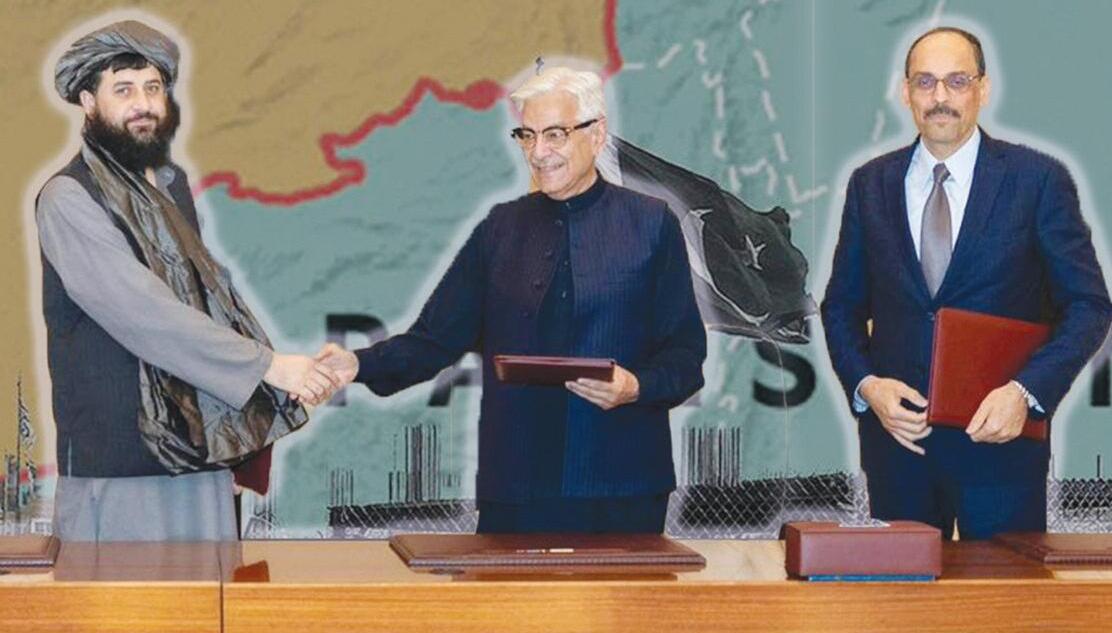
Afghan side In Islam it is said that anything that is said or committed three times is considered final so it is now final from your side? The source informed that the Afghan side “Yes” they agreed to the draft However, most shockingly, immediately after committing to the final draft and before signing on the agreement Afghan side again went outside and had a phone call to Kabul after which they again came back inside and backed off from the agreed final draft of the agreement This shocked everyone, including the Qatari and Turkish negotiators who said “Allah help and forgive these people”
The Istanbul talks therefore stalled because the Afghan side refused to convert assurances into verifiable action Pakistan remains committed to a negotiated, peaceful solution, but Islamabad would not compromise on its core demand: the prevention of its territory being used as a launchpad for attacks The mediators Qatar and Turkey conveyed their disappointment that Afghanistan did not respond to practical proposals that could have immediately re-
Pakistani delegates made it clear that if hostile groups continued to operate from Afghan territor y and attacked inside Pakistan, Islamabad would reser ve the right to take necessar y measures to defend its people and sovereignty
duced violence and restored normalcy along the border Sources present inside the negotiations also informed that the negotiations in Istanbul began about a week after the talks
and
for 18
and
Despite this, Pakistan at the request of the hosts has provided yet another oppor tunity for the talks to reach a conclusion. This is clear evidence of PakistanÊs sincerity, resolve , rational stance , and cooperative spirit PakistanÊs objective is to ensure peace and stability not only in Afghanistan and Pakistan but across the entire region, so that no threat may arise that could endang er global peace
Why global internet outages keep happening
Past outages on this scale have been caused by a wide variety of errors, including faulty updates, the accidental injection of bad code, or a change to third-par ty software that doesn’t play nicely with a ser vice
Chapple a cybersecurity expert and IT professor at the University of Notre
Mendoza College of Business The reason these events attract much more notice is because of their impact, he told CNN If a single company experiences an issue in their data center, it causes issues for that company’s products and services ” In 2024 the largest-ever IT outage brought down large portions of the internet when a devastating CrowdStrike software glitch crashed computers, led to flight cancellations and disrupted hospitals around the globe, creating $5 billion in direct business losses A bug in CrowdStrike’s cloud-based testing system pushed a problematic update to computers around the world Also last year AT&T s network went down several times, including an 11-hour meltdown that prevented many gig workers from doing their jobs
SO, WHAT WENT WRONG MONDAY?
AWS is a cloud computing provider that hosts many of the world s most-used online services In Amazon s infancy the company needed excess server capacity to ensure it had enough computing power to handle the massive amounts of traffic that came to its site during the holiday season rush Amazon realized that during the rest of the year it could use those servers to support other companies online needs and out of that AWS was born Among AWS many offerings is DynamoDB, a database that hosts information for companies, including customer data Amazon said Monday that its customers couldn’t access the data stored in DynamoDB because the Domain Name System (DNS) – a kind of phone book for the internet – had encountered a problem DNS is like an internet location engine, converting user-friendly web addresses like amazon com into IP addresses – a series of numbers that other websites and applications can understand “Amazon had the data safely stored but nobody else could find it for several hours leaving apps temporarily separated from their data, said Chapple It s as if large portions of the internet suffered temporary amnesia ” It’s not clear what caused the DNS outage but it lasted only a few hours By 6:35 am ET Amazon had fixed the DNS problem and recommended companies dump their
Power is most effec tively exercised when it need not constantly be exercised
WH E N Germany emerged as Europe’s industrial powerhouse in the 19th century the established powers spent years attempting to contain it, culminating in a war no serious statesman desired, yet none proved skilful enough to prevent Today, as we navigate the transition from American unipolarity a similar question looms: will this shift follow that tragic pattern or can it be managed through institutional adaptation as Zhou Enlai and Richard Nixon did in the early 1970s?
The multipolar order is not approaching; it’s already here Economic fundamentals have decided this outcome The only question is whether it will be managed through patient statecraft or approached through confrontation that risks catastrophic miscalculation
Two factors fundamentally distinguish today’s great power competition from past hegemonic transitions First the proliferation of nuclear weapons has created a dynamic of mutual assured destruction that renders total war irrational Putin s nuclear brinkmanship amid the Ukraine war shows not strength but desperation, simultaneously reminding all parties why direct great power confrontation has become strategically suicidal This doesn t eliminate conflict but it fundamentally changes the character of great power competition via proxy wars and economic confrontation Second, technological interdependence creates unprecedented costs for systemic rupture Semiconductor supply chains span multiple continents; artificial intelligence requires global talent pools China holds around US$730 billion in US Treasury securities The United States relies on Dutch equipment, Taiwanese fabrication and rare earth elements processed largely in mainland China to build advanced microchips China s technology objectives meanwhile depend on American design software Japanese precision machinery and Western market access These embedded relationships would be catastrophically disrupted by war between both powers, creating powerful domestic constituencies in all major economies that have a strong
In a multipolar world, great powers can either handle hegemonic transitions through rigid alliances or opt for managed accommodation
interest in avoiding systemic breakdown The Soviet Union s collapse shows why multipolarity emerges from economic realities rather than military conquest Command economies cannot generate the innovation required for sustained competition In the 1980s the Soviet Union s military expenditures were estimated to have accounted for 15 to 17 per cent of its gross national product while civilian productivity stagnated Without market pricing the Soviet economy was flying blind Central planners could not efficiently allocate resources The Soviet dissolution was a systemic adjustment not a contingent outcome of Western pressure China s trajectory validates Nixon s prediction that its people, with their “enormous economic power” would become a global force China s gross domestic product has grown from less than US$150 billion in 1978 to over US$17 trillion today As Nixon predicted, as military confrontation becomes less feasible, the competition changes and becomes much more challenging in the economic area” US-China bilateral trade almost reached US$660 billion in 2024 Economic realities create powerful incentives for managed competition rather than systemic rupture When Zhou received Nixon’s 1971 Kansas City speech outlining a five-power world including China he studied it so carefully that he showed an unaware Henry Kissinger his personal copy with Chinese annotations during their July 1971 secret meeting, recognising it as a blueprint for China s managed emergence within a stable system that would benefit both powers over decades Zhou’s genius lay in understanding what Nixon offered: recognition of China s legitimate place in the international order and a pathway to achieving it without the catastrophic war that had destroyed so many rising powers The framework acknowledged China’s legitimate interests in Asia that equilibrium among major powers served everyone better than hegemony and that institutional structures could evolve to accommodate new power distributions if approached with sophistication What followed was strategic patience of the highest order China joined the UN Security Council engaged with Bretton Woods institutions and took part in global governance not because these institutions were perfect, but because they offered platforms to Beijing that could gradually reshape to reflect its growing weight This kind of statecraft understood that power is most effectively exercised when it need not constantly be exercised Nixon understood this required reciprocal respect As he wrote in 1967, in fashioning Asia s future, there is no room for heavy-handed American pressures; there is need for subtle encouragement of the kind of Asian initiatives that help bring the design to reality The framework succeeded because it acknowledged that China s path to great power status would be determined primarily by Chinese deci-
tariq KhaN tareeN
SOUTH CHINA MORNING POST
U S , J A PA N L E A D E R S I N K R A R E E A R T H S D E A L A H E A D O F T R U M P - X I M E ET T H I S W E E K
Turkey signs $11b Eurofighter deal with Britain
clarify certain outstanding issues, the Turkish official said The Eurofighter jets delivered to Turkey on Monday were likely to be those that had been destined for Qatar Stein said Instead of being sent to Doha they ll simply be shipped to Turkey he explained
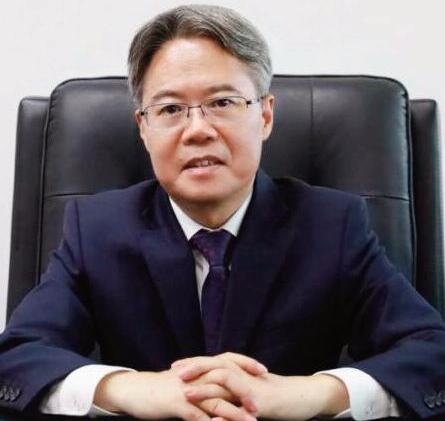
Building upon the solid foundation and good start established during the 14th FiveYear Plan period, the period covered by the 15th Five-Year Plan will be critical in this process as we work to reinforce the foundations and push ahead on all fronts toward basically achieving socialist modernization by 2035 It will thus serve as a key link between the past and the future To this end General Secretary of the CPC Central Committee Xi Jinping personally served as the leader of the drafting group for the documents of the fourth plenary session, playing a decisive role in drafting the Recommendations Xi Jinping Thought on Socialism with Chinese Characteristics for a New Era constitutes the fundamental principle and core spirit permeating the Recommendations We owe all these historic achievements in advancing China’s socialist modernization in the new era to the CPC Central Committee with Secretary General Xi Jinping at its core which has been at the helm charting the course and to Xi Jinping Thought on Socialism with Chinese Characteristics for a New Era, which has provided sound guidance to advance our cause Currently, we are thoroughly studying and implementing the spirit of General Secretary Xi Jinping’s important speech and the guiding principles of the fourth plenary session and striving vigorously to break new ground in advancing Chinese modernization In this process, we stand ready to deepen exchanges and cooperation for shared development and progress with our ironclad friend Pakistan First we stand ready to strengthen the exchange of governance experience with Pakistan and act as partners in advancing national modernization
Both China and Pakistan are developing countries, shouldering the mission of boosting economic development and improving people’s wellbeing and there is ample scope for mutual learning from each other ’s experience and practices For China the scientific formulation and successive implementation of Five-Year Plans constitute a crucial experience of the CPC in governing the country and a key political advantage of socialism with Chinese characteristics Sound assessment of the situation is a critical prerequisite for scientific decision-making We believe that during the 15th Five-Year Plan period China s development environment will face
profound and intricate changes: relations between major countries have an important bearing on the international landscape, the dynamics of which will in turn exert a profound impact on the domestic development of every country China is in a period of development where strategic opportunities exist alongside risks and challenges and uncertainties and unforeseen factors are rising Nevertheless changes engender opportunities We must therefore seize this time window, gain strategic initiative amid fierce international competition, and strive for major breakthroughs in strategic tasks pivotal to the overall advancement of Chinese modernization
To this end the Recommendations put forward the following requirements: We must continue to pursue economic development as our central task, with high-quality development as our main focus reform and innovation as the fundamental driving force meeting the people s ever-growing needs for a better life as our fundamental goal and full and rigorous Party self-governance as the fundamental underpinning for all our efforts We must promote higher-quality economic growth while achieving an appropriate increase in economic output and make solid headway in promoting well-rounded personal development and common prosperity for all All of this will allow us to secure decisive progress toward basically achieving socialist modernization In advancing and implementing these requirements, we will unswervingly uphold the Party’s overall leadership put the people first pursue high-quality development comprehensively deepen reform promote both an efficient market and a well-functioning government, and ensure both development and security These efforts are aimed at sustaining the enhancement of China’s comprehensive national strength elevating its international status and delivering a better life for its



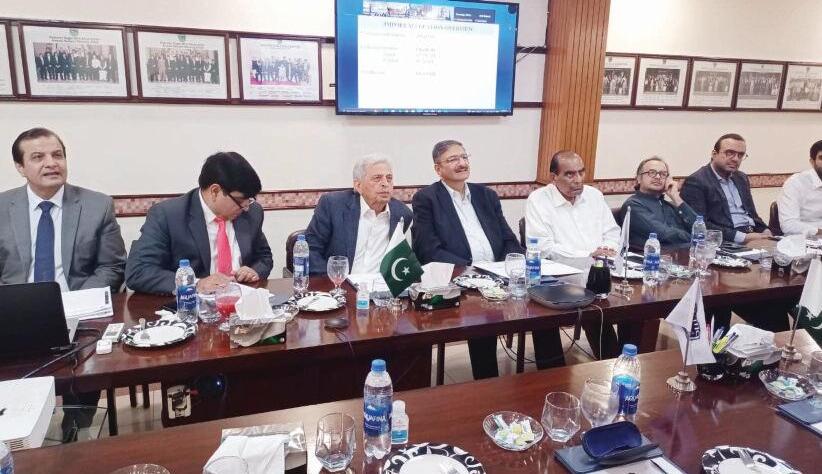

t The federal government has formed the governing body of Iqbal Academy Pakistan (IAP) Lahore for the next three years and has nominated Mian Ghulam Ahmed Jhandir from Punjab Dr Najiba Arif from Federal Area Dr Abdul Razak Sabir from Balochistan and Dr Salma Shaheen from Khyber Pakhtunkhwa as members Dr Shahzad Qaiser is already serving as the Vice President with Dr Abdul Rauf Rafiqi working Director of the Academy Mian Ghulam Ahmed Jhandir is the administrator of his private Masood Faisal Jhandir Research Library This is the largest private library in Pakistan It has three hundred thousand books and one
the SPLY The reasons for the decline, as explained above, were also partially offset by dividend income of PKR 340 million from Lucky Core PowerGen Limited (a wholly owned subsidiary) Randhawa reviews work on Shaheen Chowk Underpass project ISLAMABAD
s ta f f r e p o r t Chairman Capital Development Authority (CDA) and Chief Commissioner Islamabad Muhammad Ali Randhawa visited the Shaheen Chowk Underpass project on Tuesday He was accompanied by CDA Member Engineering, Syed Nafasat Raza and relevant officers Chairman CDA Muhammad Ali Randhawa inspected the ongoing construction activities at the project On this occasion, the relevant officers briefed Chairman CDA on the progress of the construction work for the Shaheen Chowk Underpass project They apprised that the excavation work for the underpass included in the project is progressing rapidly Furthermore, con-
4G) and GSMA have signed a long-term Memorandum of Understanding (MoU) at GITEX Global 2025 expanding collaboration not only within telecom but also across diverse industries The GSMA Open Gateway initiative is designed to help enterprises connect their services
PM SHEHBA Z URGES GLOBAL NORTH–SOUTH SYNERGY FOR CLIMATE RESILIENCE, SHARED PROSPERIT Y
Pakistan, Saudi Arabia ‘unfurl landmark ECF’ to deepen trade, investment, and strategic ties
ISLAMABAD/RIYADH s ta f f r e p o r t
Pakistan and Saudi Arabia on Tuesday formally launched the Economic Cooperation Framework (ECF) marking a new phase in their longstanding partnership that seeks to transform bilateral relations through robust trade, investment, and strategic collaboration The announcement came following a high-level meeting between Prime Minister Shehbaz Sharif and Saudi Crown Prince Mohammed bin Salman on the sidelines of the Ninth Edition of the Future Investment Initiative (FII9)
these efforts as a shared concern they reaffirmed the importance of coordinated strategies intelligence-sharing, and joint initiatives to effectively counter misinformation that undermines stability and public trust The meeting reflected the mutual desire of Pakistan and Bangladesh to further enhance defence collaboration build on existing institutional linkages and explore new avenues of cooperation within the broader framework of regional peace and security The visit of the CJCSC marks another step in Pakistan s continued engagement with friendly nations in South Asia, reinforcing Islamabad s commitment to fostering constructive military-to-military relations based on mutual respect, trust, and shared objectives
Field Marshal Asim Munir ’s Arab nations’ tour hailed as landmark in militar y diplomac y
Field Marshal Syed Asim Munir s recent visits to Egypt Jordan and Saudi Arabia have been hailed as a remarkable example of Pakistan s proactive and result-oriented military diplomacy, reinforcing the country’s growing stature as a pivotal partner in regional peace and security
During high-level meetings with the leadership of the three Arab nations, comprehensive discussions were held on counterterrorism, defence cooperation, and intelligence sharing underscoring the expanding scope of Pakistan’s strategic partnerships in the Middle East
According to official sources the leadership of Egypt, Jordan, and Saudi Arabia expressed complete confidence in Pakistan’s Armed Forces, lauding their professionalism discipline and longstanding contributions toward peace stability and cooperation in the Muslim world
n to
The Field Marshal s engagements were described as a powerful symbol of military unity and solidarity among Muslim nations a reflection of shared aspirations for enhanced security coordination and regional harmony The visit also reaffirmed Pakistan s commitment to constructive international engagement
Pakistan s Deputy Prime Minister and Foreign Minister Ishaq Dar on Tuesday expressed solidarity with Turkiye and offered humanitarian assistance following a magnitude 6 1 earthquake that struck the country’s western region injuring 22 people
According to Turkiye s Disaster and Emergency Management Authority (AFAD), the quake was centered in Sindirgi, Balikesir province Interior Minister Ali Yerlikaya said three unoccupied buildings and a two-storey shop collapsed in the area
and its readiness to contribute meaningfully to global and regional stability Observers note that under Field Marshal Asim Munir s leadership, Pakistan s defence diplomacy has taken on a new dimension combining strategic outreach with a focus on fostering mutual trust interoperability and economic-security linkages with key partners across the Arab world
No fatalities were reported though 22 people sustained injuries caused by panic-related falls Balikesir Governor Ismail Ustaoglu said Pakistan stands in full solidarity with the people of Türkiye following the 6 1 magnitude earthquake today, Dar wrote on X, adding that Islamabad was “ready to extend humanitarian assistance and aid in search and rescue efforts ” Turkiye sits atop several major fault lines and frequently experiences earthquakes In
and destroying
ISLAMABAD












